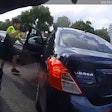More than 1,200 law enforcement officers haev been trained with Sam Houston State University's impaired driving initiatives to recognize individuals under the influence of drugs or alcohol in an effort to reduce traffic injuries and deaths.
With grants from the Texas Department of Transportation, the educational institution operates two training programs to enhance officers' abilities to identify and evaluate impaired drivers. The programs are offered free of charge to municipal, county and state law enforcement personnel at locations throughout the state.
"It's a huge problem that the public doesn't know exists," according to Senior Trooper Chuck Carlile of the Texas Department of Public Safety's Commercial Vehicle Enforcement Division. "It's rewarding when you get someone who is impaired off the road."
The Advanced Roadside Impaired Driving Enforcement (ARIDE) program provides officers with general knowledge about drug impairment and stresses the importance of collecting biological samples. The Drug Recognition Expert Course is a certification program that trains officers to detect and identify individuals under the influence of drugs or alcohol and to pinpoint the substances that may be causing the impairment.
"It is a great tool for law enforcement to get impaired drivers off the road," according to Cecelia Marquart, director of the Impaired Driving Initiatives at the university's Criminal Justice Center. "DREs have a passion for what they do — removing impaired drivers from our roadways."
While few statistics are available on drug-involved impaired driving in Texas, two drug recognition experts in the state said that drugs are detected in 20 to 25 percent of toxicology tests taken during drunken driving arrests in their areas. The most common drugs currently found in those tests are Soma (prescription cocktail), Xanax and Vicodin (hydrocodone). Various areas of the state experience more prominent use of specific drugs such as heroin and Oxycontin in San Antonio; K-2 and PCP in Dallas, and prescription drugs in Houston.
Prescription drugs are a significant problem and are responsible for many of the daytime impaired driving arrests.
"Prescription drugs are a huge problem, either they are overmedicating or abusing prescription medication," said Sgt. Mark Vincent of the Irving Police Department. "It is particularly a problem among younger drivers. Either they are using mom and dad's medication, forging prescriptions or going to multiple pharmacies."
Texas leads the nation in the number of alcohol-impaired driving fatalities in 2009. A total of 1,235 people were killed in alcohol-related accidents, which represents 40 percent of the traffic fatalities that year, according to the National Highway Traffic Safety Administration (NHTSA).
In a new report on drug use by drivers involved in fatal crashes, the NHTSA reported an increase in the level of drug involvement among fatally injured drivers between 2005 and 2009 in postmortem testing, from 13 percent in 2005 to 18 percent in 2008, in a nationwide survey. A total of 63 percent of the 21,798 drivers killed in motor vehicle accident in 2009 were tested for drugs.
In Texas, at least 23 percent of drivers killed in crashes in Texas in 2009 had drugs in their system, although the drug involvement does not mean the driver was impaired or that drug use was the cause of the crash, the report said. Postmortem testing in Texas was only performed on 1,179 of the 2,021 drivers involved in fatal accidents with 842 showing signs of drugs.
The DRE program is a 152-hour certification course which trains officers to conduct a systematic and standardized evaluation process, which include physical, mental or medical components. The evaluation, which often takes place at the police station or detention facility, generally takes about an hour. The program at SHSU has trained 375 DRE officers since 2004.
During the 12-step evaluation process, the Drug Recognition Expert evaluates and assesses the person's appearance and behavior. Vital signs are measured and recorded, and the officer makes precise observations of a person's automatic responses and reactions. The DRE also administers carefully designed psychophysical tests to evaluate the person's judgment, information processing ability, coordination and various other characteristics. The DRE will systematically consider everything about the person that could indicate the influence of drugs.
"In the courtroom, we can give expert witness testimony on how drugs affect the body and how drugs affect driving," according to Trooper Carlile. "We have successfully prosecuted impaired drivers, and they haven't gotten away with it."
The ARIDE program, which trained 630 officers through the program at Sam Houston State University since 2007, provides 16 hours of training to assist officers in identifying drug impairment during field sobriety tests. This includes an overview of the seven drug categories and the effects they have on the body as well as medical conditions or other situations that may produce similar symptoms. Officers also are given an overview of legal issues associated with impaired driving as well as pre- and post- arrest procedures.
The seven drug categories include central nervous system depressants, central nervous system stimulants, hallucinogens, dissociative anesthetics, narcotic analgesics, inhalants, and cannabis.
"After an officer goes through this program, they realize what they have missed," according to Det. Scott Foulke of the San Antonio Police Department. "They knew there was something wrong with the person, but they didn't know what it was."
















